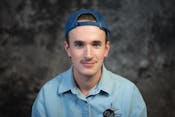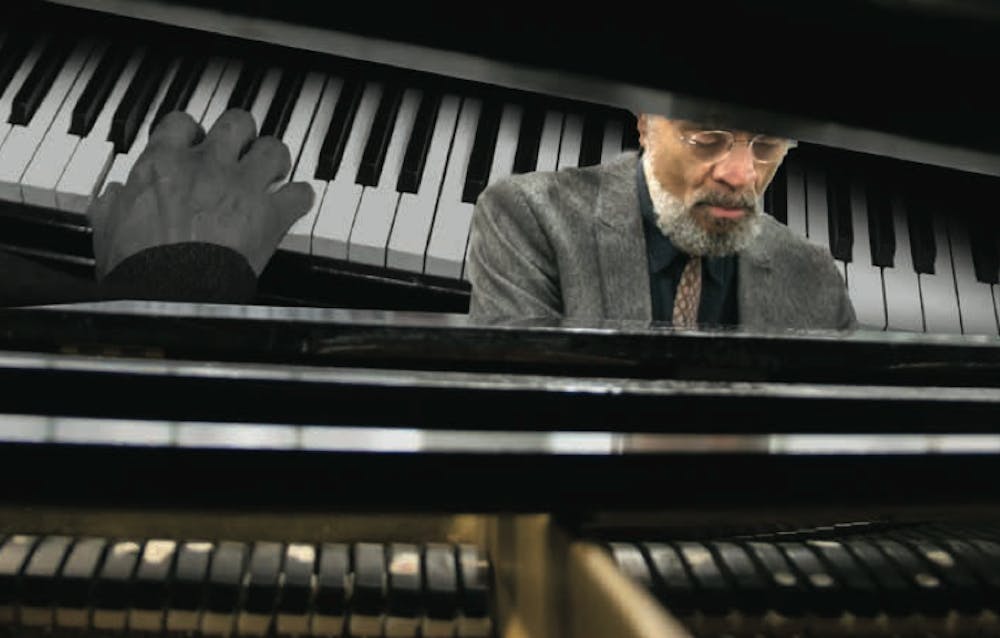When George Caldwell heard he won a Grammy in 1997, he thought it was a joke.
He couldn’t fathom how he had won the most prestigious music award in the nation.
Caldwell had recorded “Live at Manchester Craftsmen's Guild” with the Count Basie Orchestra in 1996. He had performed with the group in Pittsburgh and didn’t follow what had happened with the live recording.
Then, months later, a colleague congratulated him as he was working on the set of a Broadway show.
“I found out, indeed, that record had been made and it won a Grammy. I was not even aware it was nominated,” said Caldwell, who has served as a UB adjunct music instructor since 2014.
The win is just a slice of the Mississippi-born pianist’s storied career. It’s also one of many tales that dot the musician’s life and belie the innate talent he possesses.
Caldwell’s held numerous musical director roles for nationally touring plays and played with some of jazz music’s finest groups, including the Count Basie and Duke Ellington orchestras. He’s learned from jazz composers like Wendell Logan and Frank Foster.
The pianist plays stride music with a smile on his face, achieving tonal excellency and exquisite form. He’s completely engrossed in his performances, conveying an original style and striking keys with an effective groove.
Yet, Caldwell remains modest both behind and away from the piano.
Twenty years post-Grammy, Caldwell lives his passion through his students and through the music produced by the UB Jazz Ensemble program consisting of the Big Band and Jazz Combo. On Sunday, Caldwell will lead his jazz ensemble in Slee Hall at 3 p.m.
“When people compare me with somebody else like Dizzy Gillespie or Tony Williams, I don’t know if I deserve that. But I do have a charge,” Caldwell said.“...When someone comes to me as I went to others, then I will go to great lengths to help.”
Pianist turned educator
Caldwell’s classes are a mix of piano technique, individual counseling, philosophy and storytelling. He likes to focus on each player’s strengths and pull elements of personality into his lessons.
One early November afternoon, he listened as his jazz coaching class tooled with “Red Clay,” a Freddie Hubbard number and reimagination of Bobby Hebb’s classic “Sunny.” Caldwell reminded students to assemble harmonic clusters and asked them to “know the language” of the track. He prodded them to pay attention to the “little things” that define a collective’s sound.
“I can read Rachmaninoff, Beethoven, Coltrane and Freddie Hubbard, but I’m talking about learning to play their compositions,” Caldwell said to his students, contrasting learning from the sheet to learning by ear. “Music only exists in the time that you play it. You don’t have it until you have it in your mind and spirit.”
In 1979, Caldwell caught the attention of musician Bill Easley when the two worked at the University of Memphis on the Stevie Wonder-themed coming-of-age musical “Inner Wonder.”
Easley liked the arrangements Caldwell penned for the show and years later, helped get him a job as pianist and conductor of the Duke Ellington-inspired musical “Sophisticated Ladies.”
The play’s pianist and conductor left his position. Easley worked with Duke’s son Mercer Ellington on the musical and alerted Mercer of Caldwell’s talent.
Caldwell took the job with the musical and then landed a spot with the Ellington Orchestra in New York.
During one performance with bassist Earl May at the Harlem’s Cotton Club in 1985, Count Basie Orchestra director and former UB professor Frank Foster sat in with May’s band. Caldwell introduced himself to Foster and then Foster suggested Caldwell join his band.
“I thought he was just being encouraging,” Caldwell said. “But about four years later, he called me up and said, ‘Look, do you want to be in the Count Basie Orchestra,’ and I said ‘Uh, yeah!’”
He became a regular member of the Count Basie Orchestra in 1989.
The experience challenged Caldwell as a player. He learned a lot of Count Basie’s idiosyncrasies and avoided playing with a lot of notes. Caldwell still appears with the group occasionally and performed with them during the 2017 Brantford International Jazz Festival in Canada.
Caldwell boasts a style that makes it easy for fellow performers, who aren’t encumbered by chords which lock them in. He brings an original voice with knowledge of what makes jazz’s past important, inspired by the styles of pianists like McCoy Tyner.
Today, Caldwell is a staple in the Buffalo jazz scene — frequently playing with his trio alongside other groups of his like Star People, his Miles Davis repertoire band.
Starting the scales
Music is in Caldwell’s DNA.
His grandfather played violin and his father played, as well. Music defined his childhood.
“He just always had music around the house and taught me the first movement of Beethoven’s ‘Moonlight Sonata’ by putting my little hands on the keys,” Caldwell said of his father.
Caldwell began playing piano at 8 years old. In sixth grade, the musician moved to Holly Springs, Mississippi. There, he toured a Catholic school with his family. A nun asked if he’d like to study the piano.
He was thrilled.
“I just always knew in the back of my mind and in my heart that I would have something to do with music,” Caldwell said.
As a high school student, he took music classes at the University of Memphis and then continued his studies with his best friend’s father, Robert Garner, who taught him the “art of jazz.”
At the time, jazz, Caldwell said, wasn’t for “serious musicians.”
But he loved it and spent two years learning chords and harmonies from Garner. The lessons taught him to feel music in a way he hadn’t in his years learning 20th-century composers like Aaron Copland and Alberto Ginastera.
The solos troubled him. He wanted to play them, but he didn’t know how to grasp the music.
He left the University of Memphis after his teacher Edwin LaBounty quit over the school’s refusal to hire a black female instructor. He stayed away from the piano for roughly a year before his roommate, a cellist, pushed him to an audition for Oberlin College.
Caldwell’s roommate didn’t get into Oberlin, but Caldwell did. At Oberlin, he met jazz instructor Wendell Logan, who heard Caldwell play classical pieces and then challenged him to try his jazz classes. He did and Logan, who promised Caldwell he would be playing jazz within six months, ultimately became a mentor as Caldwell entered the professional world.
A jazz journey
Following years of live performances and doing plays around the country, Caldwell came to Buffalo in 2001.
That year, he introduced WNY to “Cookin’ at the Cookery,” a production about the life of blues singer Alberta Hunter. For over a month, Caldwell rehearsed the play’s music numbers. There he met a female member of the play’s marketing team with Studio Arena –– Constance.
He married her, stayed in Buffalo and performed often in the city and Western New York.
In 2014, Caldwell met Jon Nelson, music professor at UB and then-owner of PAUSA Art House. Nelson, who directs the UB Concert Band, loved Caldwell’s style and eventually recommended him to the hiring committee at UB.
“George brings an original voice with an awareness of the past to his performances,” Nelson said.
“He’s a classically-trained pianist and he’s got this sensitivity to all kinds of things, and he brings that to his music so it’s heavy. If someone were to go to one of his performances and observe him carefully – you will see the care that he takes in everything he does.”
Caldwell’s employment changed the music department; it began hiring local jazz musicians to teach. Bobby Militello, former member of the Dave Brubeck Quartet, came as did Sabu Adeyola, former bassist for the Ahmad Jamal Trio. The pair, along with John Bacon, have built the department’s reputation for jazz and now actively recruit high school jazz players to come to UB.
Caldwell takes his shift to music education seriously. He hopes UB will someday have a jazz major, like the ones at Harvard University and the Juilliard School. Schools like SUNY Fredonia, SUNY Oneonta and SUNY Purchase offer jazz studies programs. But UB does not.
“I think it would help the music department,” Caldwell said. “It would bring money to the department. Bill Clinton declared [jazz] a national treasure a while back. Before that, I got in trouble for studying it and playing it. I remember I got called into the dean’s office once for it. But now it’s in, and I believe it has saved the music departments of many, many schools.”
During his classes, Caldwell is jubilant, cracking jokes at times and at others, he acts out eccentric personalities to teach his students how to introduce songs.
He touches his past as well, using works in the classroom written or performed by Memphis jazz greats like Donald Brown and Mulgrew Miller.
Caldwell’s classes are a highlight for Michael Joncas, a junior music major and percussionist in UB Jazz Ensembles.
“He conveys what the music demands of us, the meaning and the emotion, because it’s easy to zone out and read through the music,” Joncas said. “But George spends the extra time to make sure we’re doing the music justice and he provides a consistency every single time he comes in.”
Eric Vlesmas, a senior music and psychology major, is in Caldwell’s jazz coaching course and ensemble class.
“George knows the material on a whole other level. He tries to communicate that to us and he actually listens to you play,” Vlesmas said. “He’s very open; he wants you to make mistakes and he’d rather you be loud making a mistake then soft and in the corner. So he wants you to voice your opinions.”
Caldwell believes his drive to help comes from former jazz greats and from his students.
“To students, they don’t know things yet, so I can help them with what they don’t know by using what I know,” Caldwell said.
“I believe that ultimately — in the final analysis — the thing that really makes a difference on the planet earth is the people. I’ve dedicated my life to these great forms of art. But after a while, I realized I love to play music. If there was no one else around to share it with, it would lose a lot of its power and impact. You’ve got to share it and that’s what makes the world go around.”
Benjamin Blanchet is the senior arts editor and can be reached at benjamin.blanchet@ubspectrum.com.

Benjamin Blanchet is the senior engagement editor for The Spectrum. His words have been seen in The Buffalo News (Gusto) and The Sun newspapers of Western New York. Loves cryptoquip and double-doubles.





